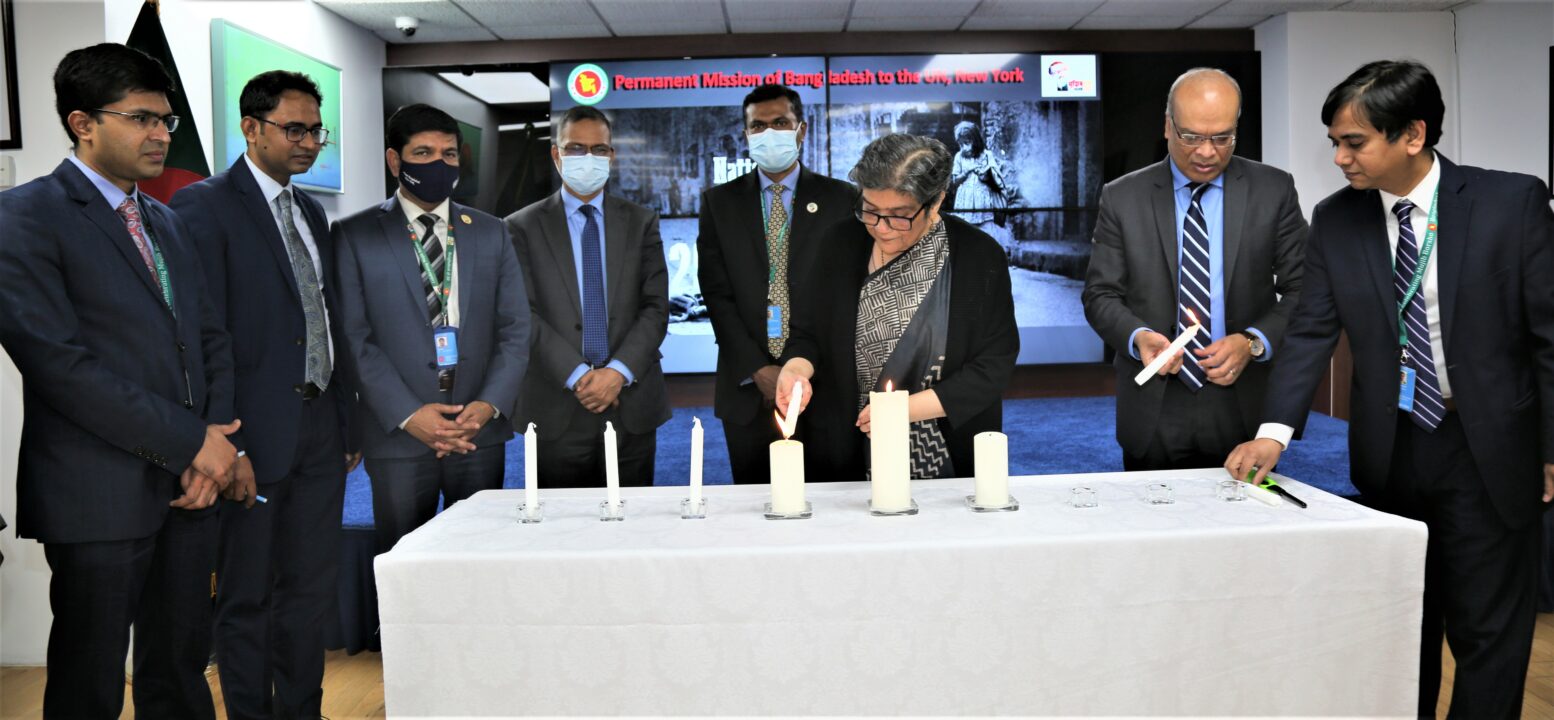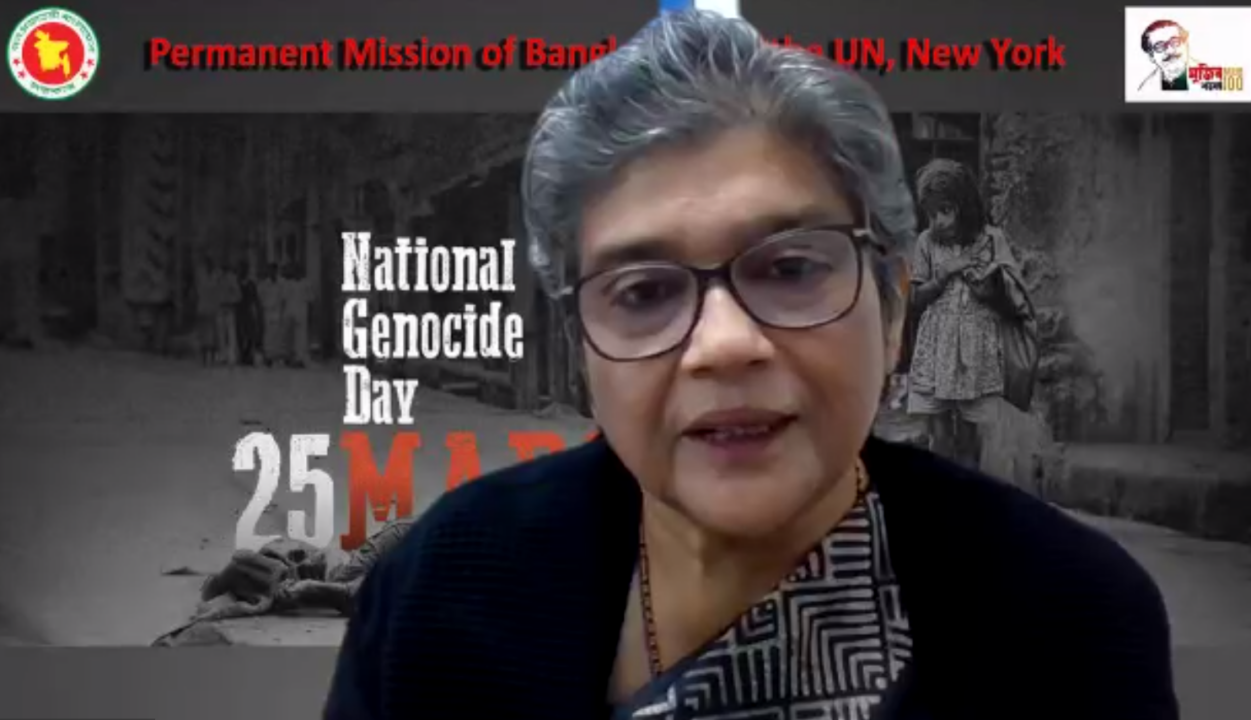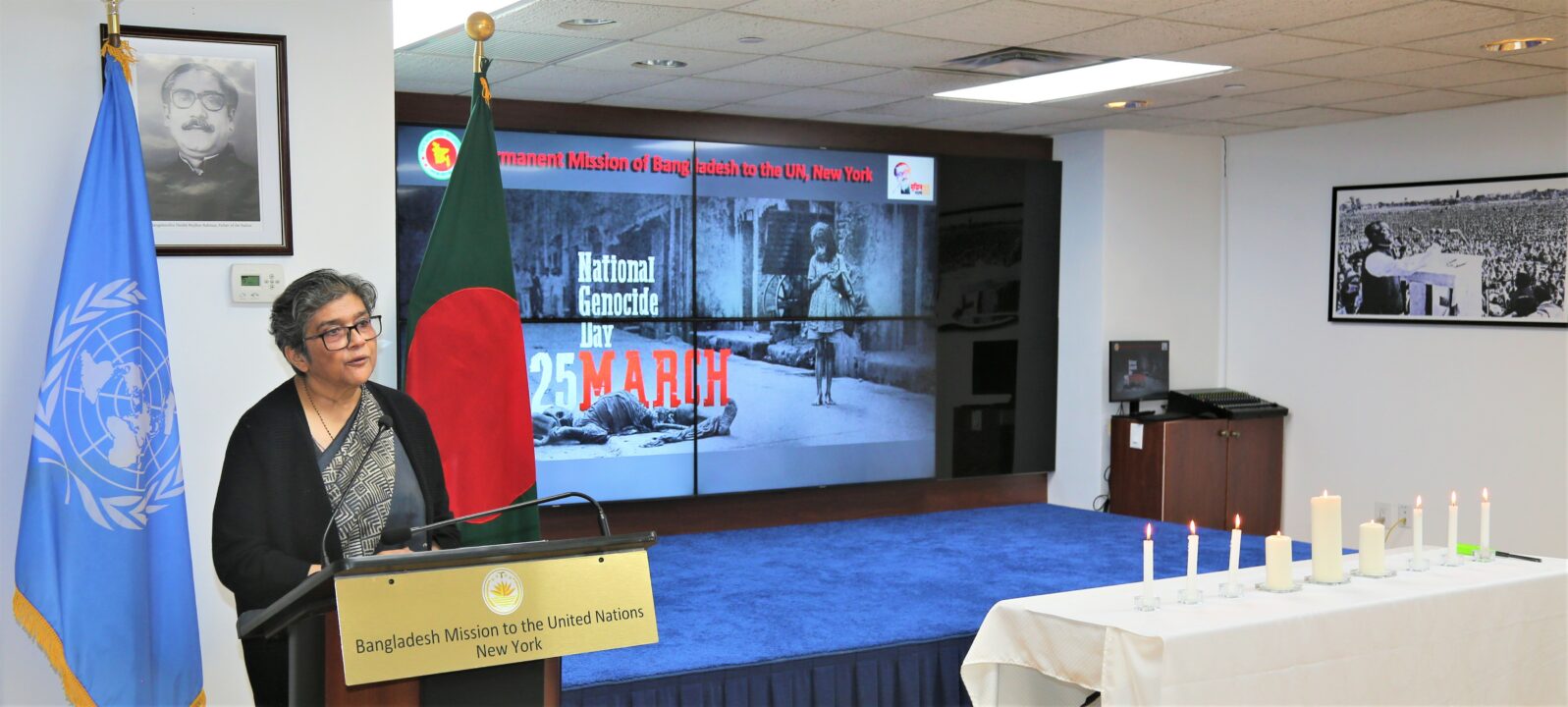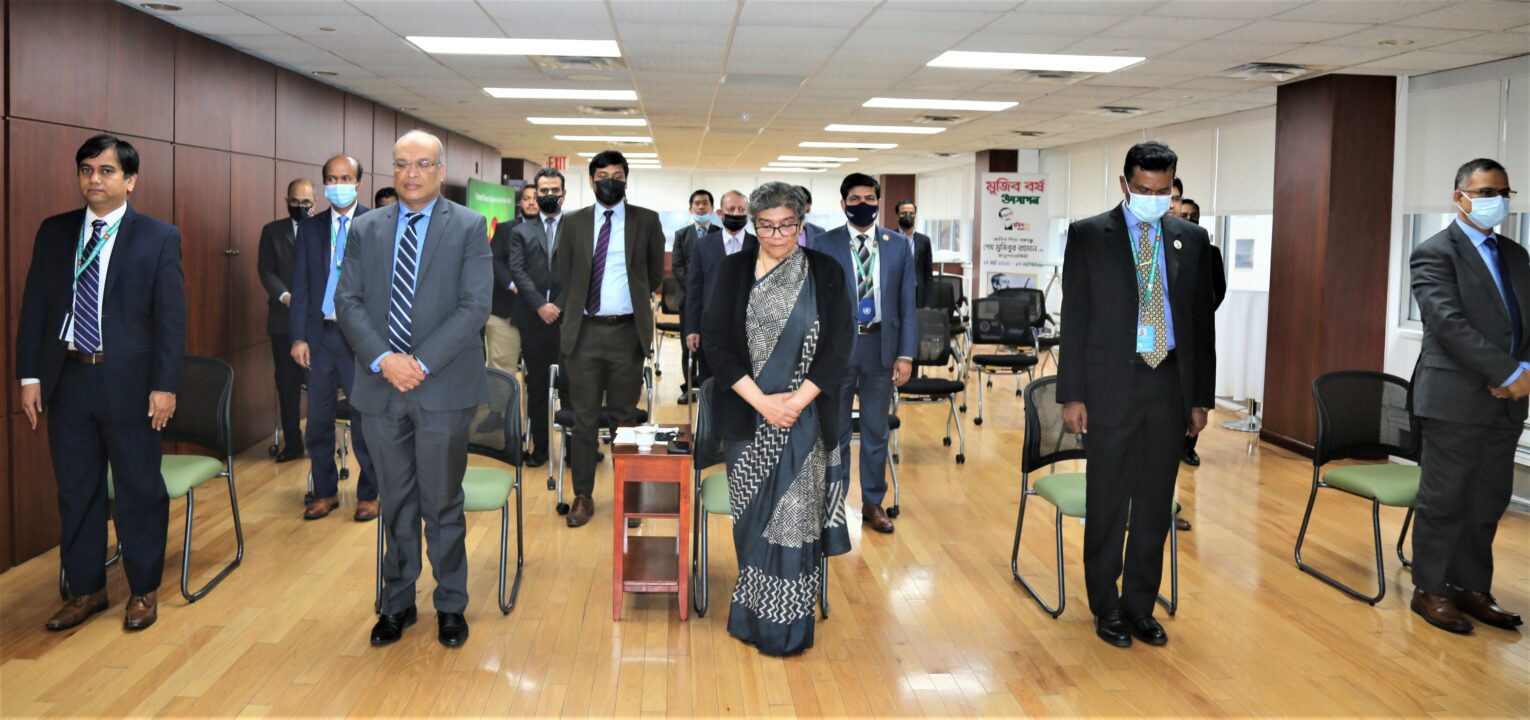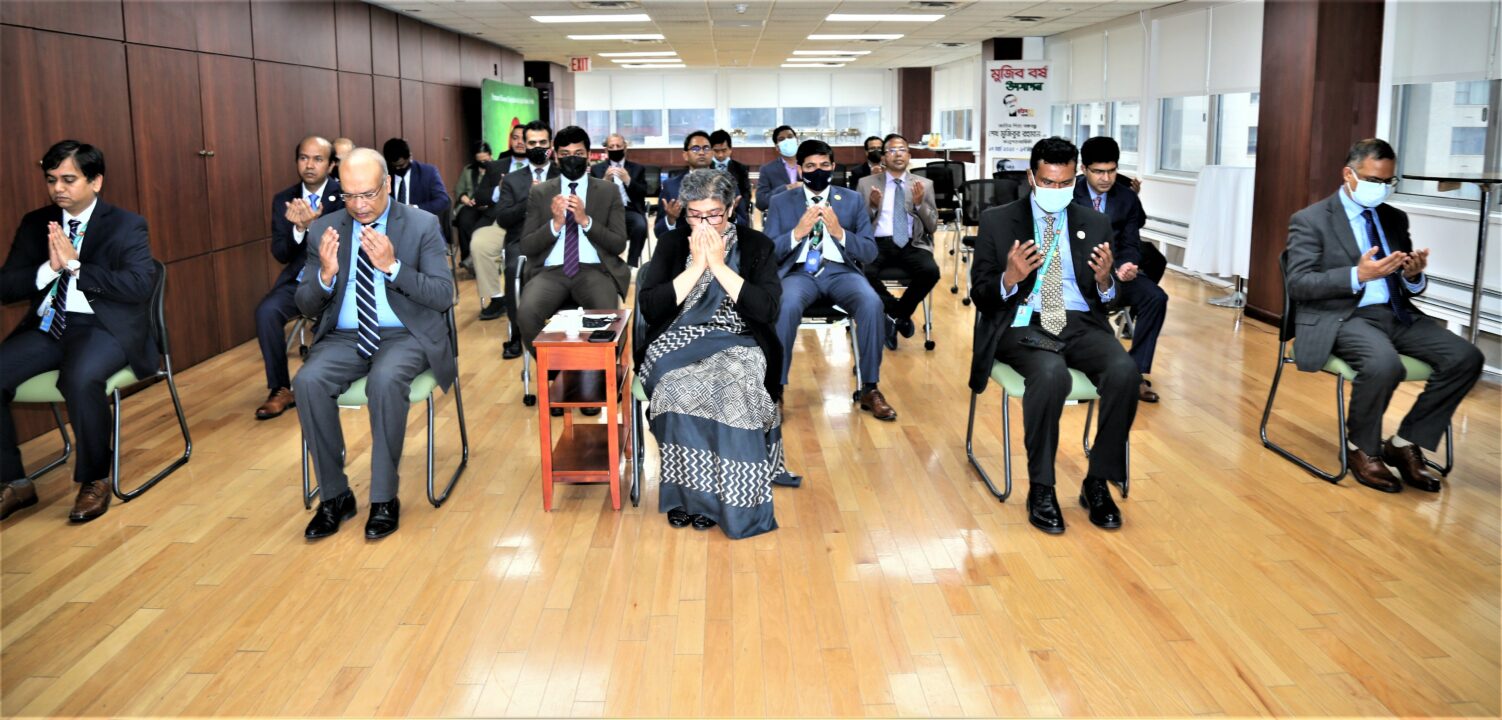New York, 25 March 2022:
“The facts of 1971 Genocide are well documented. Yet it has not been recognized in the UN discourses. We believe UN’s mandate to advance prevention will be incomplete if the past tragedies, such as ours, remain un-recognized” – said by Ambassador Rabab Fatima, Permanent Representative of Bangladesh to the United Nations in a virtual seminar on “Genocide prevention: recognition of past tragedies and restoring dignity of victims” organized by the Permanent Mission of Bangladesh to the UN in New York as part of the observance of the National Genocide Day 2022.
Professor John Hubbel Weiss, of Cornell University was the key-note speaker of the discussion while Ambassador Sven Alkalaj, Permanent Representatives of Bosnia and Herzegovina, Ambassador SovaanKe Permanent Representative of Cambodia and Barrister Tapas Kanti Baul, Prosecutor, International Crimes Tribunal of Bangladesh attended as panelists.Under Secretary General Alice Wairimu Nderitu, the Special Adviser of the Secretary-General on the Prevention of Genocide also delivered a statement at the event.
In her opening remarks, Ambassador Fatima presented the historical context of the 1971 genocide, and the savages that were launched with “Operation Searchlight” on the 25th of March 1971 that left 3 million civilians killed, 200,000 women raped and 10 million people forcibly displaced across border.
“The mass killings of 25th of March, which was intended to crush our aspirationfor political freedom and independence once for all, turned instead into anine-month long war of liberation, culminating in the birth of independent Bangladesh, led by the clarion call for independence by our Founding Father.” Said Ambassador Fatima.
In her statement, the Under-Secretary-General Nderitu stated that the crimes of genocide and atrocity crimes are the most gruesome ones and Bangladesh knows from its own history the enduring scars of these grave violations. She emphasized on strengthening early warning system and combat hate speech to prevent genocide.
Professor John Hubbel Weiss from Cornell University, in his keynote address elaborated the legal and historical aspects of other genocides committed elsewhere and how recognition of those contributed to the restoration of dignity of the victims. Sharing his experience of visiting the Liberation War Museum in Bangladesh, he praised Bangladesh’s efforts in memorialization of the genocide.
Ambassador SovaanKetermed the 1971 genocide as the second largest genocide in the history after the holocaust. He also shared the experience of Cambodia, especially in ensuring justice to help the victims heal of genocide. The Ambassador of Bosnia and Herzegovina shed lights on the failure of international community in preventing genocide in Srebrenica and urged all to recognize and address the early warning signs. Barrister Tapas kanti Baul, Prosecutor of International Crime Tribunal, Bangladesh (ICTBD) highlighted the good practices from the trial of the individuals accused of genocide and other international crimes under the principle of complementarity and suggested formation of national tribunals to ensure better connection with and healing of the victims of genocide.
Later in the afternoon, the Permanent Mission observed the ‘National Genocide Day’ at its Bangabandhu Auditorium. At the beginning of the event, a minute of silence was observed to commemorate the day, and candles were lit in memory of the martyrs of the genocide. After that, the message of the President and the Prime Minister was recited and special prayers were offered in memory of the martyrs. Ambassador Rabab Fatima delivered the welcome address in the open discussion session.
“We are working with the United Nations for international recognition of the 1971 genocide in Bangladesh, and we will continue our effort until this genocide is recognized internationally”, she said.
In both events, documentary video on the 25 March genocide was displayed.
***
নিউইয়র্ক, ২৫ মার্চ ২০২২:
বাংলাদেশে সংঘটিত ১৯৭১ সালের গণহত্যার ঘটনা অত্যন্ত ভালোভাবেই নথিভুক্ত করা আছে, তবুও এখন পর্যন্ত জাতিসংঘে স্বীকৃতি লাভ করেনি। আমরা বিশ্বাস করি, গণহত্যা প্রতিরোধে জাতিসংঘের পদক্ষেপসমূহ অসম্পূর্ণই থেকে যাবে যদি আমাদের দেশে সংঘটিত গণহত্যার মতো ঘটনাগুলো অস্বীকৃত থেকে যায়”- আজ গণহত্যা প্রতিরোধ; অতীত ট্রাজেডির স্বীকৃতি ও ক্ষতিগ্রস্থদের মর্যাদা পুনরুদ্ধার’ শীর্ষক এক ভার্চুয়াল সেমিনারে প্রদত্ত বক্তব্যে একথা বলেন জাতিসংঘে নিযুক্ত বাংলাদেশের স্থায়ী প্রতিনিধি রাষ্ট্রদূত রাবাব ফাতিমা। জাতীয় গণহত্যা দিবস-২০২২’ পালনের অংশ হিসেবে এই সেমিনারের আয়োজন করে বাংলাদেশ মিশন।
সেমিনারটির মূল বক্তা ছিলেন কর্ণেল ইউনিভার্সিটির প্রফেসর জন হাবেল ওয়েইস। জাতিসংঘে নিযুক্ত বসনিয়া ও হার্জগোভিনার স্থায়ী প্রতিনিধি রাষ্ট্রদূত সোভেন আলকালাজ, কম্বোডিয়ার স্থায়ী প্রতিনিধি রাষ্ট্রদূত সোভানকি এবং বাংলাদেশের আন্তর্জাতিক অপরাধ ট্রাইব্যুনাল এর প্রসিকিউটর ব্যারিস্টার তাপস কান্তি বাউল এতে প্যানেলিস্ট হিসাবে অংশগ্রহণ করেন। এছাড়া ইভেন্টিতে বক্তব্য রাখেন জাতিসংঘ মহাসচিবের গণহত্যা প্রতিরোধ বিষয়ক বিশেষ উপদেষ্টা আন্ডার সেক্রেটারি জেনারেল মিজ্ অ্যালিস ওয়াইরিমু এনদেরিতু। আলোচনা পর্বটির সঞ্চালক ছিলেন রাষ্ট্রদূত রাবাব ফাতিমা।
স্বাগত বক্তব্যে রাষ্ট্রদূত ফাতিমা ১৯৭১ সালের গণহত্যার ঐতিহাসিক প্রেক্ষাপট তুলে ধরেন। তিনি মহান মুক্তিযুদ্ধের ত্রিশ লাখ শহীদ, ২ লাখ নির্যাতিত মা-বোন এবং ১ কোটি মানুষকে বাস্তুচ্যুত করার ইতিহাস উল্লেখ করে বলেন, এর সূচনা হয়েছিল ১৯৭১ সালের ২৫ মার্চ ‘অপারেশন সার্চলাইট’ এর মাধ্যমে। তিনি আরও বলেন, ২৫ মার্চ গণহত্যা, যার উদ্দেশ্য ছিল আমাদের রাজনৈতিক স্বাধীনতা ও স্বাধীনতার আকাঙ্খাকে চিরতরে চূর্ণ-বিচূর্ণ করা। কিন্তু হানাদার বাহিনীর সে উদ্দেশ্য পূর্ণ হয়নি। এর বদলে জাতির পিতার উদাত্ত্ব আহ্বানে সাড়া দিয়ে নয় মাস ব্যাপী রক্তক্ষয়ী মুক্তিযুদ্ধে ঝাঁপিয়ে পড়েছিল বাঙালি জাতি। যার পরিসমাপ্তি ঘটেছিল স্বাধীন সার্বভৌম বাংলাদেশের জন্মের মধ্য দিয়ে।
আন্ডার-সেক্রেটারি-জেনারেল এনদেরিতু বলেন, গণহত্যা এবং নৃশংসতার অপরাধগুলি সবচেয়ে ভয়ঙ্কর এবং বাংলাদেশ তার নিজের ইতিহাস থেকে এই গুরুতর লঙ্ঘনের স্থায়ী ক্ষতগুলো সমন্ধে জানে। তিনি গণহত্যা প্রতিরোধে আগাম সতর্কতা ব্যবস্থা জোরদার এবং ঘৃণামূলক বক্তব্যের বিরুদ্ধে লড়াইয়ের ওপর জোর দেন।
সেমিনারটির কী-নোট স্পিকার প্রফেসর ওয়েইস বিশ্বে সংঘটিত বিভিন্ন গণহত্যা এবং আন্তর্জাতিক সম্প্রদায় কর্তৃক গণহত্যার স্বীকৃতি দেওয়ার আইনি ও ঐতিহাসিক দিকগুলি বিশদভাবে ব্যাখা করেন। তিনি বাংলাদেশের মুক্তিযুদ্ধ জাদুঘর পরিদর্শনের অভিজ্ঞতার কথাও উল্লেখ করেন এবং ৭১ এর গণহত্যার স্মৃতি ও ইতিহাস সংরক্ষণে বাংলাদেশের প্রচেষ্টার প্রশংসা করেন।
কম্বোডিয়ার রাষ্ট্রদূত ১৯৭১ সালের গণহত্যাকে হলোকাস্ট এর পরে বিশ্বের ইতিহাসে দ্বিতীয় বৃহত্তম গণহত্যা বলে অভিহিত করেন। তিনি এ বিষয়ে কম্বোডিয়ার অভিজ্ঞতা বিশেষ করে ন্যায় বিচার প্রতিষ্ঠার মাধ্যমে গণহত্যার শিকার ব্যক্তিবর্গের পরিবারের মর্মযাতনা লাঘবে গৃহীত পদক্ষেপের কথা উল্লেখ করেন।
বসনিয়া হার্জেগোভিনার রাষ্ট্রদূত তাঁর বক্তব্যে স্রেব্রেনিকায় সংঘটিত গণহত্যা প্রতিরোধে আন্তর্জাতিক সম্প্রদায়ের ব্যর্থতার বিষয়ে আলোকপাত করেন এবং প্রাথমিক সতর্কতা চিহ্নগুলি সনাক্ত এবং সমাধান করার জন্য সবাইকে আহ্বান জানান।
বাংলাদেশের আন্তর্জাতিক অপরাধ ট্রাইব্যুনাল (আইসিটিবিডি) এর প্রসিকিউটর ব্যারিস্টার তাপস কান্তি বাউল সম্পূরক নীতির আওতায় গণহত্যা ও অন্যান্য আন্তর্জাতিক অপরাধে অভিযুক্ত ব্যক্তিদের বিচার সংক্রান্ত উত্তম অনুশীলনগুলোর কথা তুলে ধরেন এবং জাতীয় ট্রাইব্যুনাল প্রতিষ্ঠা করার উপর গুরুত্বারোপ করেন যাতে গণহত্যায় ক্ষতিগ্রস্ত পরিবারসমূহের সাথে আরও ভালো সংযোগ স্থাপিত হয় ও তাদের কষ্ট কিছুটা লাঘব হয়।
এদিকে বিকালে ‘জাতীয় গণহত্যা দিবস’ উপলক্ষে স্থায়ী মিশনের বঙ্গবন্ধু মিলনায়তনে মিশনের সকল স্তরের কর্মকর্তা-কর্মচারিগণের উপস্থিতিতে দিবসটি পালন করা হয়। অনুষ্ঠানের শুরুতেই দিবসটির স্মরণে একমিনিট নিরবতা পালন ও গণহত্যার শিকার শহীদদের স্মরণে মোমবাতি প্রজ্জ্বলন করা হয়। এর পর রাষ্ট্রপতি ও প্রধানমন্ত্রীর বাণী পাঠ এবং শহীদদের স্মরণে বিশেষ মোনাজাত করা হয়। উন্মুক্ত আলোচনা পর্বে স্বাগত বক্তব্য রাখেন রাষ্ট্রদূত রাবাব ফাতিমা। প্রদত্ত বক্তব্যে তিনি বলেন ১৯৭১ সালের গণহত্যার আন্তর্জাতিক স্বীকৃতির জন্য আমরা জাতিসংঘের সাথে কাজ করে যাচ্ছি। এই গণহত্যার আন্তর্জাতিক স্বীকৃতি আদায় না হওয়া পর্যন্ত আমাদের এ প্রচেষ্টা অব্যাহত থাকবে।
উভয় অনুষ্ঠানেই ৭১ এর গণহত্যার উপর একটি প্রামাণ্য ভিডিও প্রদর্শন করা হয়।
***

